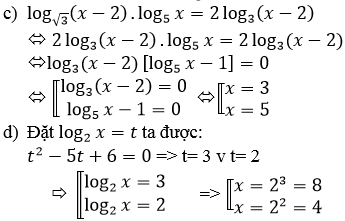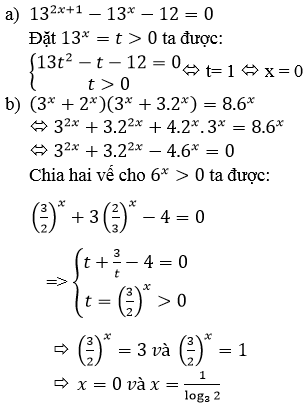Hãy nhập câu hỏi của bạn vào đây, nếu là tài khoản VIP, bạn sẽ được ưu tiên trả lời.

1/ ĐKXĐ: \(x>0\)
\(log_{5x}5-log_{5x}x+log_5^2x=1\)
\(\Leftrightarrow\dfrac{1}{log_55x}-\dfrac{1}{log_x5x}+log_5^2x=1\)
\(\Leftrightarrow\dfrac{1}{1+log_5x}-\dfrac{1}{1+log_x5}+log_5^2x-1=0\)
\(\Leftrightarrow\dfrac{1}{1+log_5x}-\dfrac{log_5x}{1+log_5x}+\left(log_5x-1\right)\left(log_5x+1\right)=0\)
\(\Leftrightarrow\dfrac{1-log_5x}{1+log_5x}-\left(1-log_5x\right)\left(1+log_5x\right)=0\)
\(\Leftrightarrow\left(1-log_5x\right)\left(\dfrac{1}{1+log_5x}-\left(1+log_5x\right)\right)=0\)
\(\Leftrightarrow\left[{}\begin{matrix}1-log_5x=0\\\dfrac{1}{1+log_5x}=1+log_5x\end{matrix}\right.\) \(\Leftrightarrow\left[{}\begin{matrix}1-log_5x=0\\1+log_5x=1\\1+log_5x=-1\end{matrix}\right.\) \(\Leftrightarrow\left[{}\begin{matrix}x=5\\x=1\\x=\dfrac{1}{25}\end{matrix}\right.\)
2/ ĐKXĐ: \(x>0\)
\(log_5\left(5^x-1\right).log_{25}\left(5^{x+1}-5\right)=1\)
\(\Leftrightarrow log_5\left(5^x-1\right).log_{5^2}5\left(5^x-1\right)=1\)
\(\Leftrightarrow log_5\left(5^x-1\right)\left(1+log_5\left(5^x-1\right)\right)=2\)
\(\Leftrightarrow log_5^2\left(5^x-1\right)+log_5\left(5^x-1\right)-2=0\)
\(\Leftrightarrow\left[{}\begin{matrix}log_5\left(5^x-1\right)=1\\log_5\left(5^x-1\right)=-2\end{matrix}\right.\) \(\Leftrightarrow\left[{}\begin{matrix}5^x-1=5\\5^x-1=\dfrac{1}{25}\end{matrix}\right.\) \(\Leftrightarrow\left[{}\begin{matrix}5^x=6\\5^x=\dfrac{26}{25}\end{matrix}\right.\)
\(\Leftrightarrow\left[{}\begin{matrix}x=log_56\\x=log_5\dfrac{26}{25}\end{matrix}\right.\)
3/ ĐKXĐ: \(x>0\)
\(2log_3^2x-log_3x.log_3\left(\sqrt{2x+1}-1\right)=0\)
\(\Leftrightarrow log_3x\left(2log_3x-log_3\left(\sqrt{2x+1}-1\right)\right)=0\)
\(\Leftrightarrow\left[{}\begin{matrix}log_3x=0\Rightarrow x=1\\2log_3x-log_3\left(\sqrt{2x+1}-1\right)=0\left(1\right)\end{matrix}\right.\)
Xét (1): \(log_3x^2=log_3\left(\sqrt{2x+1}-1\right)\Leftrightarrow x^2=\sqrt{2x+1}-1\)
\(\Leftrightarrow x^2+1=\sqrt{2x+1}\Leftrightarrow x^4+2x^2+1=2x+1\)
\(\Leftrightarrow x^4+2x^2-2x=0\Leftrightarrow x\left(x^3+2x-2\right)=0\)
\(\Leftrightarrow\left[{}\begin{matrix}x=0\left(l\right)\\x^3+2x-2=0\end{matrix}\right.\) ????
Pt bậc 3 kia có nghiệm rất xấu, chỉ giải được bằng công thức Cardano mà bậc phổ thông không học, nên bạn có chép đề sai không vậy?

-log22 x2_ log2x2- 20=0
↔ pt này vô ng bạn ơi!!! xem lại đầu bài.
Bài này phương trình có tận 4 nghiệm chứ không phải vô nghiệm đâu bạn Đỗ đại học nhé
Điều kiện \(x\ne0\)
Ta có từ phương trình ban đầu cho \(\Leftrightarrow4\log_2^2\left|x\right|-2\log_2\left|x\right|-20=0\)
\(\Leftrightarrow2\log_2^2\left|x\right|-\log_2\left|x\right|-10=0\)
Đặt \(t=\log_2\left|x\right|\) ta được phương trình \(2t^2-t-10=0\Leftrightarrow\begin{cases}t=-2\\t=\frac{5}{2}\end{cases}\)
Với \(t=2\Rightarrow\log_2\left|x\right|=-2\Leftrightarrow\left|x\right|=\frac{1}{4}\Leftrightarrow x=\pm\frac{1}{4}\)
Với \(t=\frac{5}{2}\Rightarrow\log_2\left|x\right|=\frac{5}{2}\Leftrightarrow\left|x\right|=\sqrt{32}\Leftrightarrow x=\pm\sqrt{32}\)
Vậy phương trình có 4 nghiệm : \(x=\frac{1}{4};x=-\frac{1}{4};x=\sqrt{32};x=-\sqrt{32}\)

\(2^x=x^2\Rightarrow xln2=2lnx\Rightarrow\frac{ln2}{2}=\frac{lnx}{x}\Rightarrow x=2\)
Ta cũng có \(\frac{2ln2}{2.2}=\frac{lnx}{x}\Rightarrow\frac{ln4}{4}=\frac{lnx}{x}\Rightarrow x=4\) \(\Rightarrow\left\{{}\begin{matrix}a=2\\b=4\end{matrix}\right.\)
Pt dưới: \(4logx-\frac{logx}{loge}=log4\)
\(\Leftrightarrow logx\left(4-ln10\right)=log4\Leftrightarrow logx\left(ln\left(\frac{e^4}{10}\right)\right)=log4\)
\(\Rightarrow logx=\frac{log4}{ln\left(\frac{e^4}{10}\right)}=log4.log_{\frac{e^4}{10}}e\)
\(\Rightarrow x=10^{log4.log_{\frac{e^4}{10}}e}=\left(10^{log4}\right)^{log_{\frac{e^4}{10}}e}=2^{2.log_{\frac{e^4}{10}}e}\)
\(\Rightarrow\left\{{}\begin{matrix}c=2\\d=4\end{matrix}\right.\)
Bạn tự thay kết quả và tính

a) Đặt t = 13x > 0 ta được phương trình:
13t2 – t – 12 = 0 ⇔ (t – 1)(13t + 12) = 0
⇔ t = 1 ⇔ 13x = 1 ⇔ x = 0
b)
Chia cả hai vế phương trình cho 9x ta được phương trình tương đương
(1+(23)x)(1+3.(23)x)=8.(23)x(1+(23)x)(1+3.(23)x)=8.(23)x
Đặt t=(23)xt=(23)x (t > 0) , ta được phương trình:
(1 + t)(1 + 3t) = 8t ⇔ 3t2 – 4t + 1 = 0 ⇔ t∈{13,1}t∈{13,1}
Với t=13t=13 ta được nghiệm x=log2313x=log2313
Với t = 1 ta được nghiệm x = 0
c) Điều kiện: x > 2
Vì nên phương trình đã cho tương đương với:
[log3(x−2)=0log5x=1⇔[x=3x=5[log3(x−2)=0log5x=1⇔[x=3x=5
d) Điều kiện: x > 0
log22x – 5log2x + 6 = 0
⇔(log2x – 2)(log2x – 3) = 0
⇔ x ∈ {4, 8}


Điều kiện x>1
Từ (1) ta có \(\log_{\sqrt{3}}\frac{x+1}{x-1}>\log_34\) \(\Leftrightarrow\frac{x+1}{x-1}>2\) \(\Leftrightarrow\) 1<x<3
Đặt \(t=\log_2\left(x^2-2x+5\right)\)
Tìm điều kiện của t :
- Xét hàm số \(f\left(x\right)=\log_2\left(x^2-2x+5\right)\) với mọi x thuộc (1;3)
- Đạo hàm : \(f\left(x\right)=\frac{2x-2}{\ln2\left(x^2-2x+5\right)}>\) mọi \(x\in\left(1,3\right)\)
Hàm số đồng biến nên ta có \(f\left(1\right)\) <\(f\left(x\right)\) <\(f\left(3\right)\) \(\Leftrightarrow\)2<2<3
- Ta có \(x^2-2x+5=2'\)
\(\Leftrightarrow\) \(\left(x-1\right)^2=2'-4\)
Suy ra ứng với mõi giá trị \(t\in\left(2,3\right)\) ta luôn có 1 giá trị \(x\in\left(1,3\right)\)
Lúc đó (2) suy ra : \(t-\frac{m}{t}=5\Leftrightarrow t^2-5t=m\)
Xét hàm số : \(f\left(t\right)=t^2-5t\) với mọi \(t\in\left(2,3\right)\)
- Đạo hàm : \(f'\left(t\right)=2t-5=0\Leftrightarrow t=\frac{5}{2}\)
- Bảng biến thiên :
| x | 2 \(\frac{5}{2}\) 3 |
| y' | + 0 - |
| y | -6 -6 -\(\frac{25}{4}\) |
Để hệ có 2 cặp nghiệm phân biệt \(\Leftrightarrow-6>-m>-\frac{25}{4}\)\(\Leftrightarrow\)\(\frac{25}{4}\) <m<6






